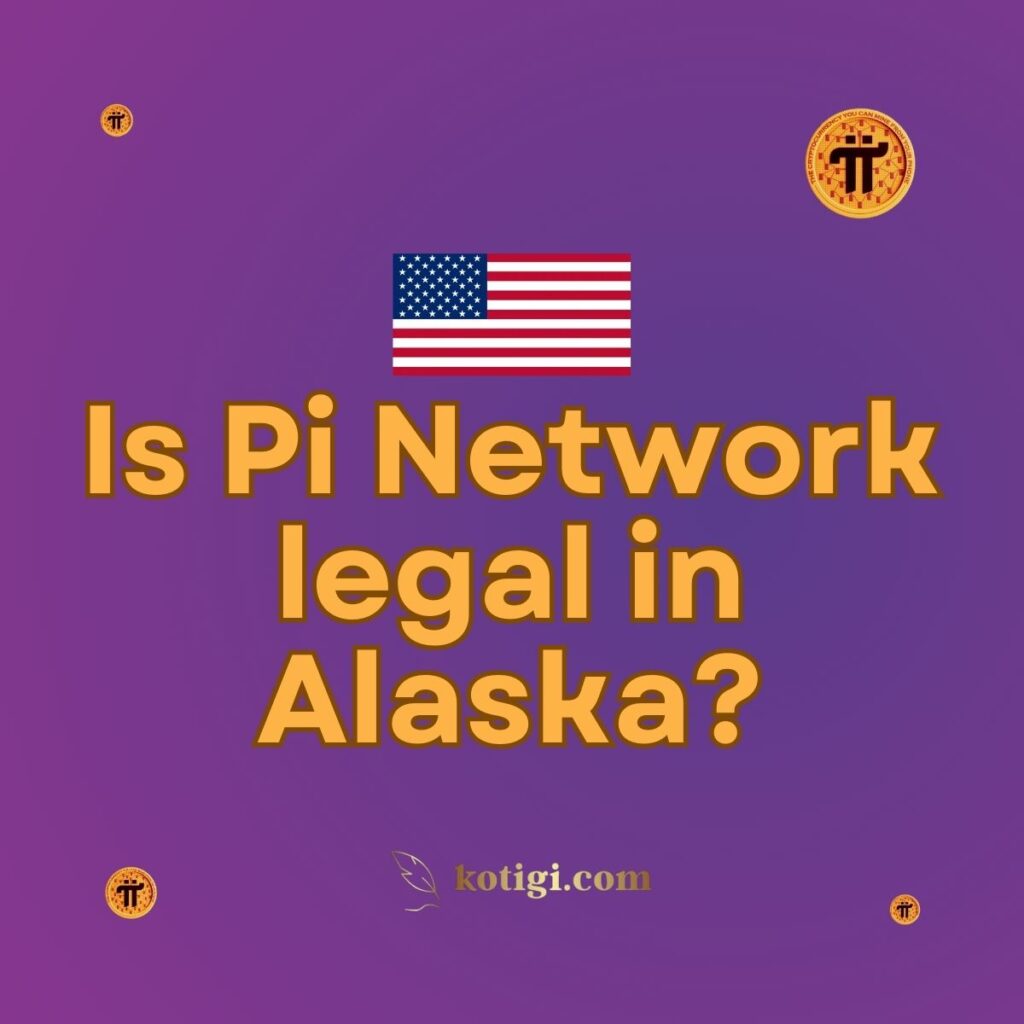
Is Pi Network legal in Alaska?
Pi Network is legal in Alaska, as the state has not imposed any specific laws or regulations prohibiting the use or operation of cryptocurrencies, including Pi Network. However, like the rest of the United States, Pi Network users in Alaska must adhere to federal regulations governing digital assets, such as Anti-Money Laundering (AML) laws, tax reporting, and compliance with securities regulations. The legal status of Pi Network in Alaska largely depends on how it aligns with federal cryptocurrency policies, as the state itself has not established a unique legal framework for digital currencies.
Introduction
The legal landscape for cryptocurrencies is constantly evolving, and understanding the current status of Pi Network in different regions is crucial for its users. In Alaska, the legal environment is relatively straightforward, as the state has not yet enacted specific legislation targeting cryptocurrencies. This means that, for the time being, Pi Network users in Alaska can participate in the platform without facing any state-imposed restrictions. However, this does not mean there are no regulations to consider. Federal laws, including AML compliance and tax obligations, play a significant role in determining how cryptocurrencies like Pi are treated across the U.S., and Alaska is no exception.
In this post, we’ll explore the legality of Pi Network in Alaska, examine the federal regulations that impact its users, assess potential legal risks, and highlight the opportunities available to Alaskans who engage with the platform. Additionally, we’ll discuss future developments that could influence the legal landscape for Pi Network in Alaska.
1. Cryptocurrency Regulations in Alaska
Alaska, like many U.S. states, does not have state-specific regulations governing the use or trading of cryptocurrencies, including Pi Network. This means that residents of Alaska are free to participate in the Pi Network without facing any legal hurdles unique to the state. However, it is essential for users in Alaska to understand that federal cryptocurrency regulations still apply.
1.1 Absence of State-Specific Cryptocurrency Laws
Currently, Alaska has not introduced any specific cryptocurrency legislation, meaning that digital currency activities, including Pi Network, operate without a dedicated state-level regulatory framework. This provides users with some level of freedom to engage with the platform, as there are no additional compliance requirements unique to Alaska.
1.2 General Business Laws Applicable to Cryptocurrencies
While there may not be state-specific cryptocurrency regulations, Alaska does enforce general business and consumer protection laws that could affect Pi Network users. For example, any fraudulent or deceptive activity related to cryptocurrency transactions would still fall under Alaska’s consumer protection laws. This means that while Pi Network is legal, users should remain cautious about scams or fraudulent activities, as they would be prosecuted under existing laws.
2. Federal Regulations for Pi Network in Alaska
Although Alaska does not have specific cryptocurrency regulations, Pi Network users in the state must comply with federal laws that govern cryptocurrencies in the U.S. These regulations ensure that digital currencies are used legally and responsibly across all states, including Alaska.
2.1 Anti-Money Laundering (AML) Compliance
One of the most important federal regulations that Pi Network users in Alaska must follow is AML compliance. This set of laws is designed to prevent cryptocurrencies from being used for illegal activities, such as money laundering or terrorism financing. Pi Network, like other cryptocurrency platforms, implements Know Your Customer (KYC) procedures to verify the identity of its users and comply with AML regulations. This means that users in Alaska will need to provide identification when engaging in certain transactions to ensure compliance with these federal laws.
2.2 Tax Reporting Obligations
Another key federal regulation affecting Pi Network users in Alaska is the obligation to report cryptocurrency activities to the Internal Revenue Service (IRS). The IRS classifies cryptocurrencies as property, meaning that any transactions, trades, or mining activities conducted on Pi Network could result in taxable events. Pi Network users in Alaska must report gains or losses on their tax returns, as failing to do so could result in penalties or fines from the IRS.
2.3 Securities and Exchange Commission (SEC) Regulations
Federal securities laws, overseen by the Securities and Exchange Commission (SEC), may also affect Pi Network’s operations in Alaska. The SEC is responsible for regulating securities, and if Pi Network or its tokens are deemed to be securities, they would be subject to more stringent regulations. While Pi Network currently operates as a cryptocurrency and not a security, the evolving regulatory landscape means that users in Alaska should stay informed about potential changes in classification.
3. Legal Risks of Using Pi Network in Alaska
While Pi Network is legal in Alaska, users should be aware of the potential legal risks associated with using cryptocurrency platforms. These risks stem from the evolving regulatory environment, as well as the possibility of fraud or privacy concerns.
3.1 Uncertainty in Future Regulations
One of the primary legal risks for Pi Network users in Alaska is the possibility of future regulatory changes. Cryptocurrencies are still a relatively new technology, and governments around the world are continuing to develop regulatory frameworks to address their use. While Alaska has not introduced any specific cryptocurrency laws yet, new legislation could be enacted in the future, potentially changing the legal landscape for Pi Network users.
3.2 Fraud and Scams
Another risk for Pi Network users in Alaska is the potential for fraud or scams. The decentralized nature of cryptocurrencies can make it easier for malicious actors to take advantage of unsuspecting users. Pi Network participants should be vigilant and cautious when interacting with others on the platform, especially in transactions involving real-world value.
3.3 Data Privacy Concerns
Like many digital platforms, Pi Network requires users to provide personal information as part of its KYC process. This raises concerns about data privacy, as the potential for data breaches or misuse of personal information exists. Users in Alaska should carefully review Pi Network’s privacy policies and ensure they are comfortable with how their data is being handled.
4. Opportunities for Pi Network Users in Alaska
Despite the potential legal risks, Pi Network offers several opportunities for users in Alaska. These opportunities include access to a decentralized financial system, low transaction costs, and the potential for long-term investment growth.
4.1 Access to a Global Financial System
Pi Network provides Alaskans with the opportunity to participate in a global, decentralized financial system. Unlike traditional banking, which often involves intermediaries and high fees, Pi Network allows users to engage in peer-to-peer transactions without relying on centralized institutions. This can be particularly advantageous for those seeking to move away from traditional financial systems.
4.2 Low Transaction Costs
One of the key benefits of using Pi Network is the platform’s goal to provide low-cost transactions. This could be particularly beneficial for Alaskans who engage in international transactions, as they may avoid the high fees typically associated with cross-border payments through traditional banks.
4.3 Early Adoption Benefits
Another potential opportunity for Pi Network users in Alaska is the ability to be early adopters of a growing cryptocurrency. As Pi Network’s user base and infrastructure expand, early participants may see the value of Pi tokens increase. This presents the possibility of long-term investment growth, as more people join the network and the demand for Pi tokens rises.
5. Future Legal Developments for Pi Network in Alaska
The legal status of Pi Network in Alaska is largely shaped by federal regulations, but future state-level developments could change the way users engage with the platform.
5.1 Possibility of State-Level Regulation
While Alaska currently does not regulate cryptocurrencies at the state level, this could change as the technology becomes more widespread. Future state regulations could impose new compliance requirements on Pi Network users, such as enhanced KYC procedures or licensing requirements for cryptocurrency platforms operating in Alaska. It is essential for Pi Network users to stay informed about potential legal changes to ensure continued compliance.
5.2 Increased Federal Oversight
Federal agencies like the SEC and IRS are expected to increase their oversight of cryptocurrency activities in the coming years. This could result in additional reporting requirements or stricter enforcement of existing laws, particularly concerning tax reporting and securities regulations. Alaskans using Pi Network should remain up-to-date with federal legal developments to avoid potential legal issues.
Conclusion
In summary, Pi Network is currently legal in Alaska, with no specific state-level regulations prohibiting its use. However, users must comply with federal regulations, including AML laws, tax reporting obligations, and potential securities regulations. While the legal environment surrounding cryptocurrencies is constantly evolving, Alaskans can engage with Pi Network as long as they stay informed about potential legal risks and future regulatory changes.
Key Takeaways
- Pi Network is legal in Alaska, with no state-specific cryptocurrency regulations currently in place.
- Users must adhere to federal laws, including Anti-Money Laundering (AML) regulations and tax reporting obligations.
- Pi Network presents opportunities for low-cost transactions and global financial access for Alaskans.
- Legal risks include potential regulatory changes, fraud, and data privacy concerns.
- Future legal developments at both the state and federal levels could impact how Pi Network operates in Alaska.





